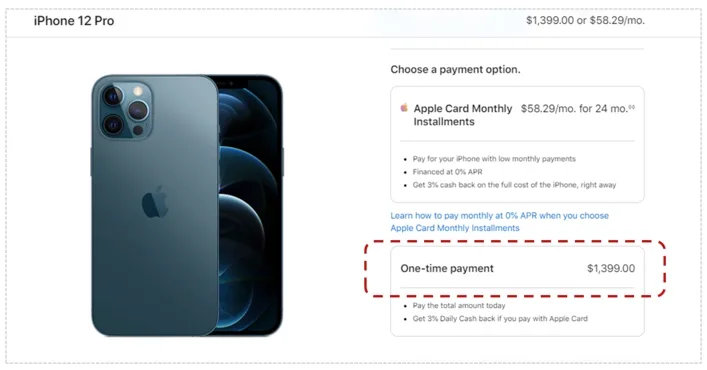Apple’s iPhone 13 could cost consumers more due to an increase in the price of certain components. This is bad news for users, but probably good news for Apple stock investors.
IPhone users thinking of upgrading their devices this year (or those looking to switch to the iOS-based product) should expect to reach deeper into their pockets. DigiTimes has reported that Apple’s iPhone 13 could be launched next month at a higher price due to parts inflation.
Bad news for consumers could be great news for Apple stock investors. If the price increase is confirmed, it provides evidence that AAPL might be a great inflation play during these times of worry over rising producer and consumer prices.

What happened?
The iPhone is already considered a pricey tech gadget that can cost as much as $1,400 for the fully loaded, higher-end 12 Pro Max model in the US (see figure below). Due to this year’s components shortage, chip maker TSMC may raise its part prices to Apple by 3% to 5%, which could lead to a similar increase in the price of the yet-to-be-announced iPhone 13.
It is unlikely that one of the largest and most successful consumer product companies in the world would try to raise prices without confidence that doing so does not impact demand for the new iPhone substantially. Apple can probably afford to hike prices because the company understands the value and the appeal of its luxury brand.

A quote from Jim Cramer
One of the most concerning headwinds to stocks in the foreseeable future is the possibility of inflation eroding corporate margins and leading to higher interest rates in 2021-2022. But should producer and consumer prices spike, not all stocks will be impacted equally.
Generally speaking, companies with strong pricing power that are able to pass on the higher production costs to consumers will likely outperform. This is a point that Mad Money’s Jim Cramer has made recently. Here is his quote:
“When you try to think of what’s working in this market... I want you to ask yourself, would you be insensitive to a price increase if the company put one through? [What are] the companies that can raise prices without infuriating you? Go buy their stocks.”
The impact to the P&L
Are higher prices a good or a bad thing for a company’s financial performance? The answer is nuanced and depends on a few factors.
Holding all else constant, higher prices also mean higher revenues (think of the formula for sales: price times quantity). If the increase in price is decoupled from an increase in product or operating costs, then the hike also helps to boost margins – thus profits as well.
However, “holding all else constant” is not how the world really works. A change in price tends to have an impact on a few key variables, most important of which is demand. If higher prices do not impact units sold by much or at all, this is great news for revenues and, most likely, earnings.
The other piece to consider is whether the price hike fully or only partially offsets higher costs. Assuming the latter, revenues can still benefit without a corresponding positive effect on margins and profits. The complexity presented by the many moving parts makes it hard to determine with certainty how a more expensive iPhone may impact Apple’s financial statements in the future.
Comments